The man who planned to succeed Tony Blair is doing far more for refugees outside of politics
Nothing, it seems, can fluster David Miliband. Not the pressure of advising a prime minister while still in his 20s, not the tabloid-ready turn of brotherly betrayal that derailed his UK political career, not comments from Hillary Clinton that suggest she finds Miliband, her British counterpart while she was US secretary of state, to be quite the hottie.
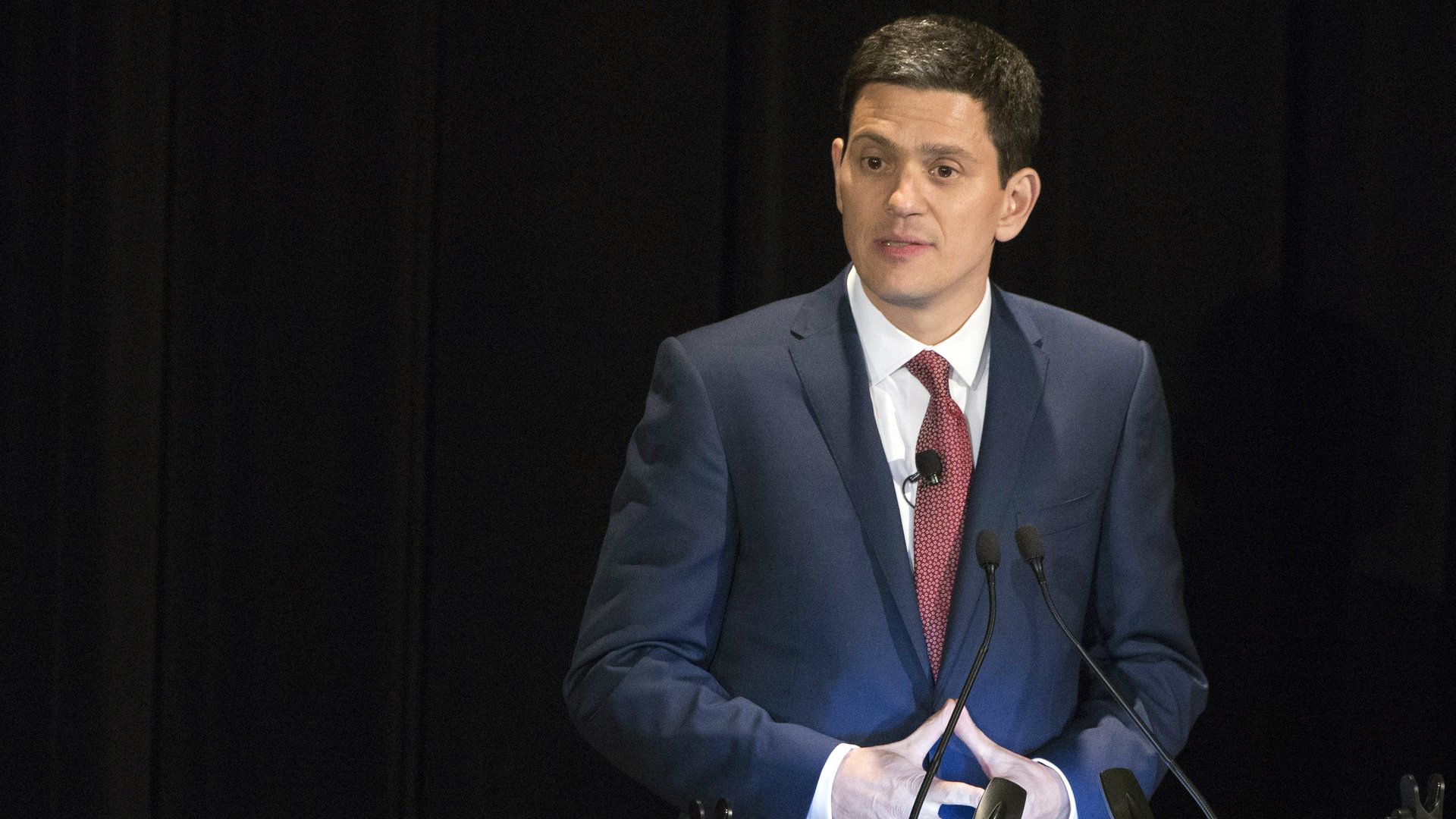

Nothing, it seems, can fluster David Miliband. Not the pressure of advising a prime minister while still in his 20s, not the tabloid-ready turn of brotherly betrayal that derailed his UK political career, not comments from Hillary Clinton that suggest she finds Miliband, her British counterpart while she was US secretary of state, to be quite the hottie.
More on that later. Right now, I’m with Miliband at the New York headquarters of the International Rescue Committee, a non-governmental organization working to abate the biggest refugee crisis since World War II. And Miliband, the IRC’s president since 2013, is clearly not being flustered today by Texas.
The day before our meeting, Texas sued both the IRC and the US federal government in a bid to prevent Syrian refugees from entering the state. The refugees whom the IRC has been arranging to resettle in the US after a lengthy vetting process are some of the most vulnerable survivors of the Syrian crisis; in the face of such suffering, the Texas lawsuit might seem like an outrageous denial of refugee rights. But Miliband shows no signs of frustration.
“I’m cognizant that we’ve got a longstanding partnership with state and local officials and with local people,” he says. “My priority is not to get angry, that’s not really the issue. I’m passionate about the needs of the people and about the compassion that Americans have historically shown.”
Ever the diplomat, and often a pragmatist, Miliband takes a stoical approach to his role leading a refugee-resettlement organization through the worst refugee crisis in 70 years. With 60 million refugees and internally displaced people worldwide, Miliband’s job places him in the middle of a massive global debate, one that extends beyond the current wrestling over the Syrian resettlement question, and grapples with chaos and suffering across the world.
The IRC, founded in 1933 at the request of Albert Einstein, currently operates in 40 countries around the globe—Central African Republic, Afghanistan, Iraq, and Haiti among them—to implement emergency response plans, create programs to protect female refugees from violence, and resettle as many refugees as possible in the US. It’s vital work, and yet it doesn’t offer the same level of influence as he’s used to.
“The power in an NGO is less than the power in a government department, but in some ways the obstacles are less,” he tells me, matter-of-factly. More than two years since he left politics and became an immigrant himself, even Miliband seems unsure exactly how he wound up here.
“Losing is tough”
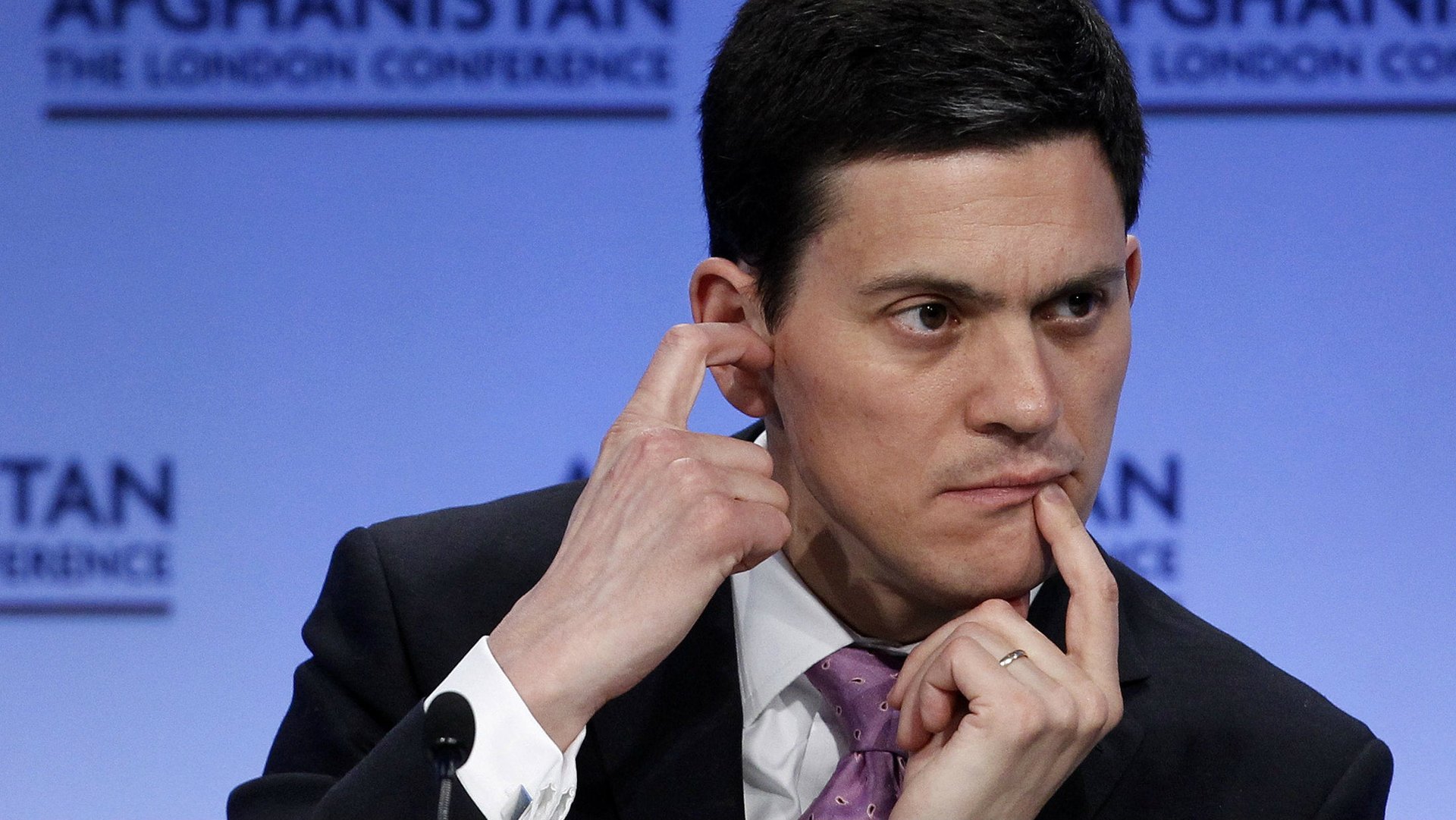
At 29, Miliband, an Oxford-educated political analyst, became head of policy for Prime Minister Tony Blair. As he navigated the ranks of the Labour party and rotated through several cabinet posts—schools minister, environment secretary, the youngest foreign secretary in 30 years—it was often said that Miliband was prime minister material himself. He was considered competent and brainy, though British public opinion diverged from Clinton’s in viewing Miliband as something of a geek.
When Labour lost the general election in 2010 and Blair’s successor, Gordon Brown, stood down as party leader, it was widely assumed that Miliband would take the role. But unexpectedly, his younger brother, Ed Miliband, who had held the position of energy and climate change secretary and was generally perceived as less qualified and less polished than his older brother, ran against his sibling. And while David Miliband had the support of his party —81 nominations to his brother’s 63, and the endorsement of leading Labour figures—Ed Miliband, who is more leftwing, secured the support of the unions. In an extremely tight election, the elder brother and expected heir to the party leadership was defeated by his younger sibling.
As David Miliband wrote to Clinton, it was a personally difficult result. “Losing is tough,” he wrote in an email since released as part of a public disclosure of Clinton’s email records from her time as secretary of state. “When you win the party members and MPs doubly so. (When it’s your brother…).” He stepped down from frontline politics and, in 2013, explained his relocation to New York and the IRC by saying he, “didn’t want to become a distraction” to his brother or to the party. Some eight months later, and three years on from the election, Ed Miliband said their relationship was “still healing.”
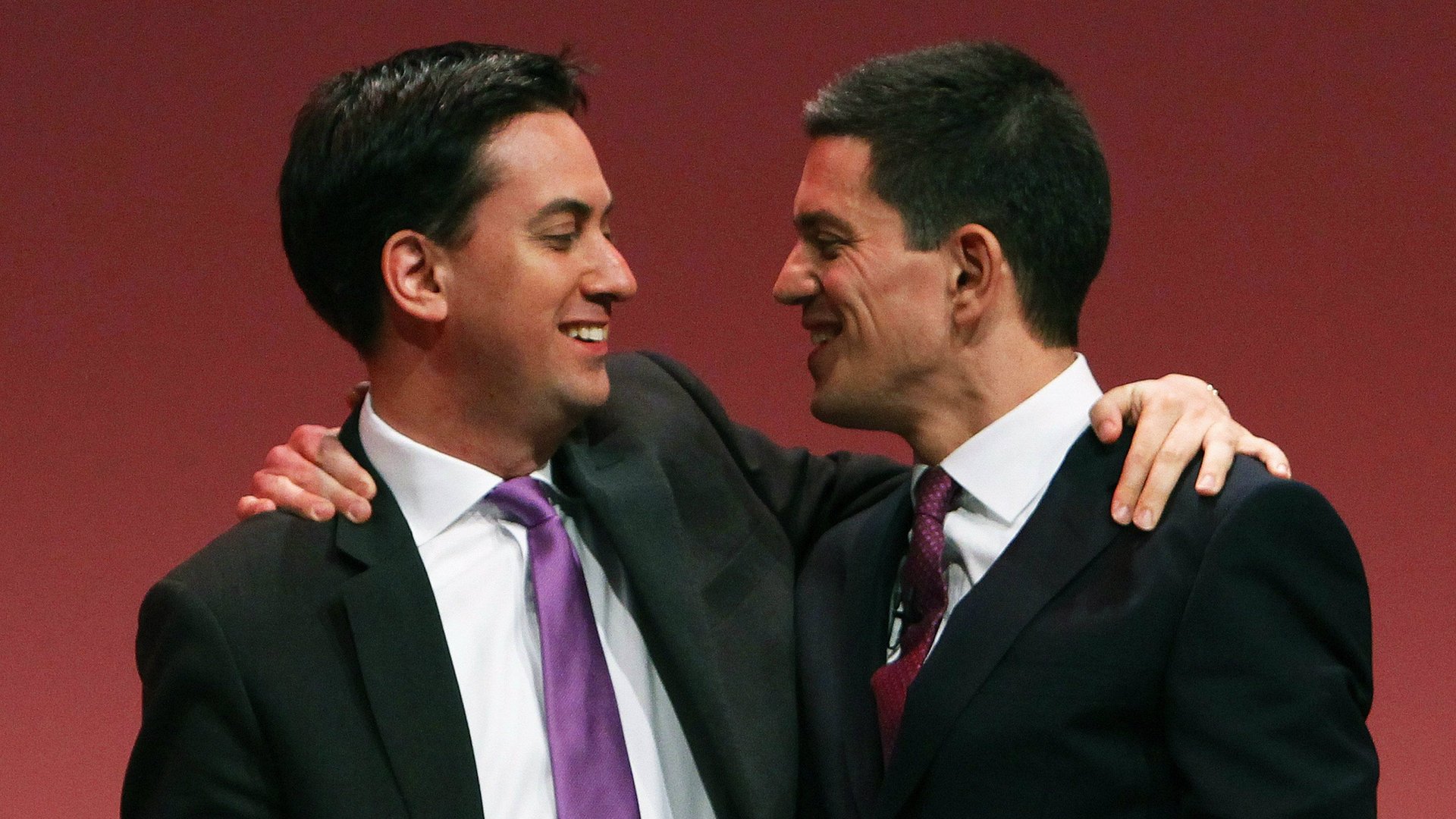
Just after the defeat at the polls, a journalist with the BBC speculated that David Miliband “may be tempted to take a job on the international stage, if a suitably big one came along.” One did, when Miliband was brought into the IRC to replace George Rupp, the former head of Columbia University, as president and CEO of the humanitarian relief group.
Given his political history, and the level of intrigue that swarms around the brotherly feud in the UK, little wonder that, when we meet to discuss his work, Miliband speaks like a carefully crafted press release. He rattles off statistics, dodges questions with bland language, and (apropos no particular question) describes his charity as “solutions-focused, outcomes-orientated, delivering maximum good for people in great need.”
But in person, he’s warm enough to make even PR claptrap sound engaging. He’s quick to laugh (when I ask what readers can do to help, Miliband mentions volunteering and advocacy before adding that “the well-endowed readers of Quartz are welcome to become donors—I did bring that third rather than first!”) and asks me far more questions than most interview subjects. Miliband wants to hear about my own move from London to New York, about my career, and about the subjects I cover. He might be painstakingly diplomatic but he delivers his lines with a naturally friendly manner, and it’s easy to understand why Clinton, who led the US State Department during Miliband’s turn as British foreign secretary, found him so appealing.
The former US first lady and current Democratic presidential frontrunner wrote in her 2014 autobiography that Miliband “caused me to gulp and smile simultaneously” when he described Clinton as “the right Hercules” for the job. She also described Miliband as, “young, energetic, smart, creative, and attractive, with a ready smile.”
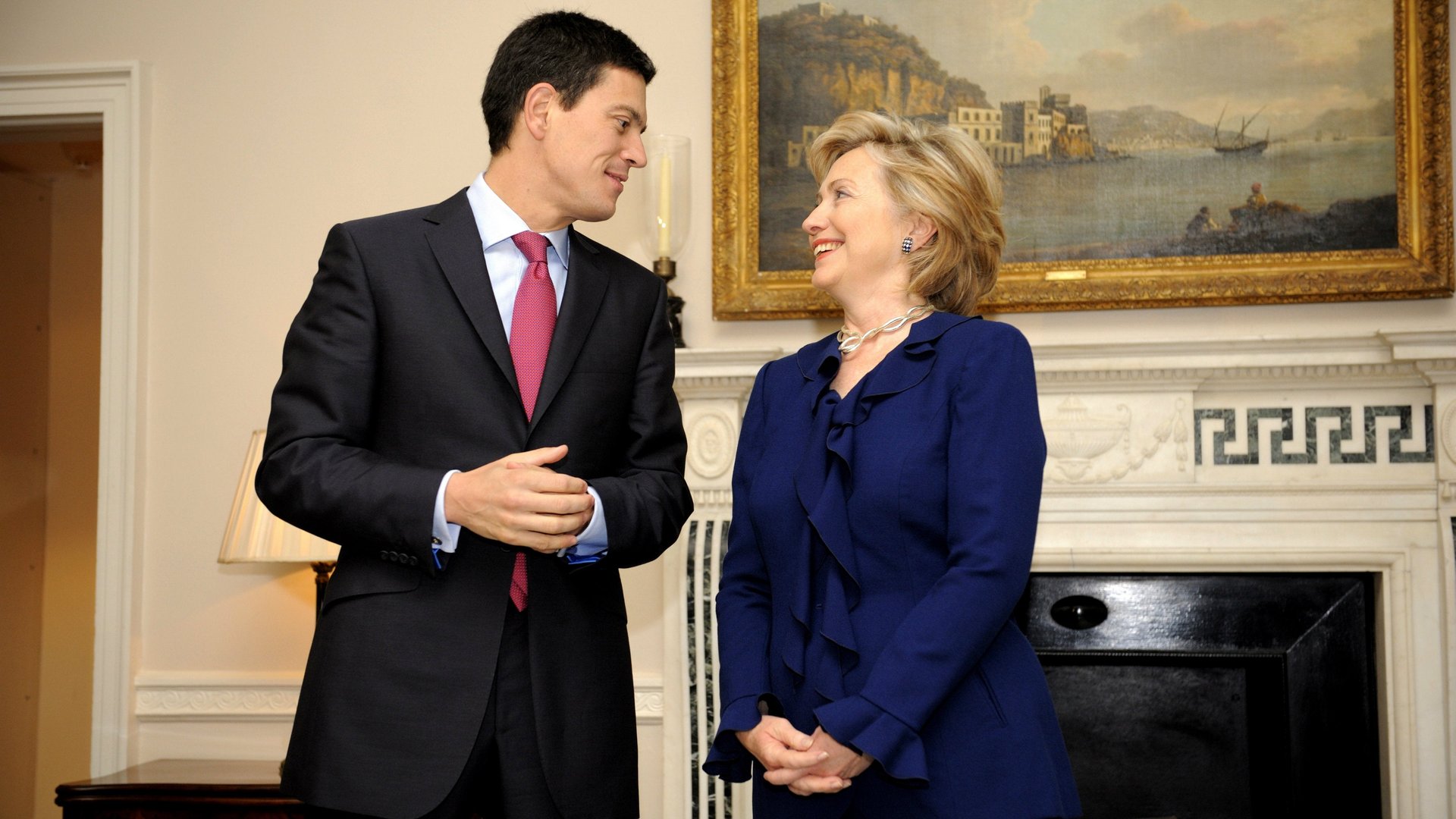
And that was restrained in comparison to her comments five years earlier in an interview with Vogue. Prompted by her interviewer’s admission that she once “got a crush over the phone” talking to Miliband, Clinton was quick to agree: “If you saw him it would be a big crush,” she said. “I mean, he is so vibrant, vital, attractive, smart. He’s really a good guy. And he’s so young!”
Emotional affinity
Miliband was born in London in 1965. His Belgian-born father fled to Britain to escape the Nazis; his mother’s family emigrated from Poland. While their status as refugees has perhaps given Miliband a personal connection to his work at the IRC, he’s not particularly emotional about his work.
“I wouldn’t want to overplay it,” he says. “If you talk to anyone who worked with me when I was minister for schools, or secretary for the environment, or foreign secretary, people say when I do things I don’t do them by halves in the sense of a commitment to things. But yes, I think emotional affinity [for the IRC’s work] is one way of putting it.”
Currently, the IRC is calling for the US to accept 100,000 Syrian refugees next year, a number based on the UN estimate of the most vulnerable people, and endorsed by US president Barack Obama. But realistically, these demands aren’t likely to be met.
“It’s obviously a stretch,” says Miliband. “But I’m not here to make predictions. At the moment, the debate is how to keep the doors open for those refugees who are in the president’s plan, which is 10,000.”
I ask what else, given the political realities, Miliband would like the IRC to achieve in the coming year. After thinking for a moment, he seems to make up an answer on the spot.
“Other than bringing the war in Syria to an end, umm…. Well, this would be quite nice: Let’s get 50 governments to match the UK government for committing 50% of its overseas aid spending to fragile states,” he says, then bursts out laughing. “Fifty’s actually a lot. Did I say five or did I say 50?”
Miliband might not manage to make 50 countries to change their foreign aid policies, and it doesn’t sound like he’ll wear himself out trying to reach an impossible goal. But, if he chooses to make it a focus, he could well persuade a handful of countries to make the change.

Meanwhile, he says he sympathizes with the policy dilemmas that governments face in deciding how many refugees to accept, if not quite so deeply in the US—which has taken in a scant 2,174 Syrian refugees since 2012—then certainly in Europe, which has seen more than a quarter of a million Syrian refugees arrive. Germany and Sweden have been by far the most generous in welcoming asylum seekers.
But he also suggests that the political tension German chancellor Angela Merkel and other government leaders are now up against might not have escalated so drastically had Europe opened its borders more generously in the years before the mass migration out of Syria reached such epic proportions.
“These are very difficult situations and it’s doubly difficult, triply difficult, quadruply difficult to play catch up—which is what Europe is doing,” he says. “It’s much harder for Mrs. Merkel and the rest of the world now than it would have been three years ago.”
And harder still because the migration from Syria is not happening in a vacuum.
“The Syrian crisis is the leading humanitarian catastrophe of our age, it’s the worst humanitarian emergency of the 21st century—not least because it’s spiraling, it’s snowballing—but that shouldn’t take away from the fact that you’ve got 4.5 million people in humanitarian need in South Sudan, you’ve got massive, chronic needs in Afghanistan and Pakistan,” Miliband says.
“You do have to ask yourself hard questions about how a world that’s got much better at preventing war between states has ended up seeing this proliferation of wars within states.”
Settling in
Despite moving 3,400 miles away, Miliband is still subject to endless speculation that he is secretly plotting a return to British politics. And yet for all the reports that Labour MPs are forever glancing over their shoulder at Miliband, the leader that could’ve been, British politics has moved decidedly on in the years since he left.

The Labour party had a catastrophic general election defeat under Ed Miliband, who is now a backbench MP without a cabinet role. And, in a leadership election that was met with jubilation by Tories and serious concern from many Labour MPs, the party is now led by self-described socialist Jeremy Corbyn—a far cry from the New Labour years of Blair and David Miliband.
The night prior to my meeting Miliband at the IRC, British parliament voted to launch airstrikes in Syria. Previously, Miliband has spoken in favor of military intervention. (In a speech before he left to join the IRC, he said, “Syria feels like an instance to support the maxim attributed to Frederick the Great: Diplomacy without weapons is like music without instruments.”)
His brother, meanwhile, was in the minority of MPs to vote against military action in the recent debate—and was arguably the single biggest influence in persuading the UK and the US to decide against an intervention in 2013.
David Miliband says he didn’t argue the issue with his brother—“He makes his own decisions about his political views,” he says. And, as his NGO job prevents him from wading into politics, he refuses to be drawn out on whether he supports the UK’s decision to get involved in the conflict. “The only celebration is when there’s a prospect of the Syrian war coming to an end,” he says.
Staying focused
Miliband is similarly coy on the subject of British politics generally. John McDonnell, Corbyn’s shadow chancellor (the parliamentary position that oversees economic decisions), recently quoted chairman Mao in the House of Commons. Surely, as someone who had a very different vision for the Labour party, this must be difficult to watch?
Miliband smiles broadly, puts his hands in his pockets, and shrugs, eyebrows raised. “I have many thoughts,” he says. “I’m a British citizen and a Labour party member so obviously I have many views. But not those that I’m going to allow to divert from the focus of this interview.”
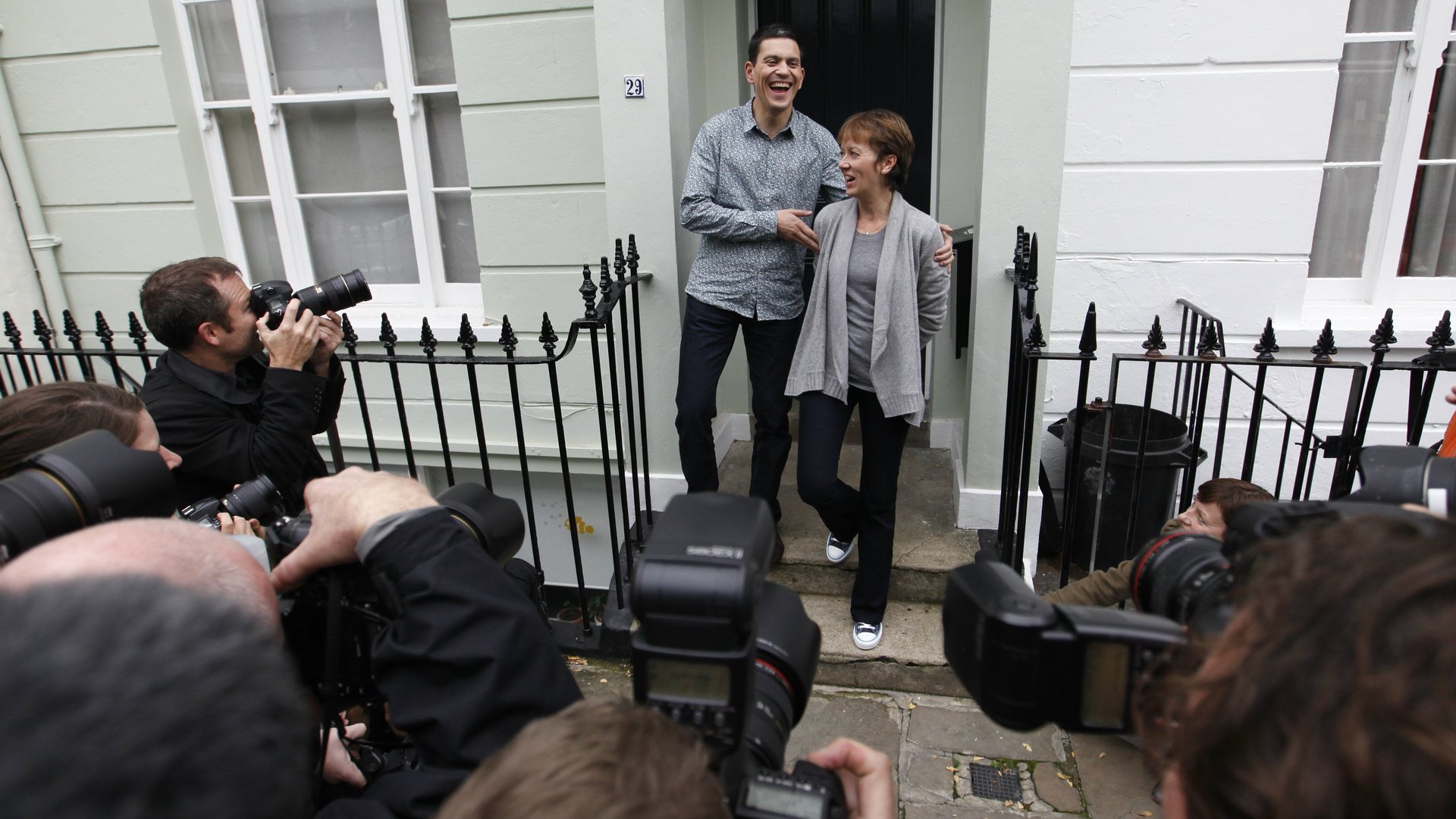
The rumors that Miliband’s eye is on UK politics, rather than trained 100% on his job at the IRC, are unlikely to fade completely, but the statistics Miliband happily cites suggest he’s working hard at his job in New York.
The NGO has grown by 48% in the two years he’s been in charge, he says, making it a $700 million organization. And he notes the IRC is “leading the response in Lesbos,” the Greek island where many Syrians are coming to shore each day—without forgetting about conflicts elsewhere.
If life had panned out just slightly differently, it could have been Miliband making the call about how many refugees to welcome, into Britain at least. But as the effects of the global refugee crisis ripple on and Labour stays out of power, Miliband’s pragmatism could well be more useful on this side of the pond.